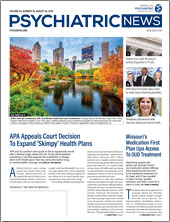At APA’s 2019 Annual Meeting in May, it was to the credit of the organization that many sessions focused on matters related to blacks and other minorities within APA. There were academic discussions that highlighted the historical differences between the APA of decades ago and the present status of the organization. The minority caucuses at this meeting were vibrant, their members active, and the sense of community was palpable. I quietly noted, however, that while advocates of diversity in other organizations have been speaking out and working toward inclusion of minorities, blacks have not consistently been the beneficiaries of the sustained drumbeating. Other groups seeking fairness and equity in society also deservedly attract attention with their complaints and their demands; however, in American society, many blacks continue to be caught up in mundane experiences that are persistently racialized. For them, there is this feeling that America is not yet in a post-racial phase. This concern is not limited to blacks and their racial struggle. A casual perusal of the daily lay press suggests that other minority groups are often worried about the enduring nature of their struggles.
After the Annual Meeting, I began rereading African American Bioethics: Culture, Race, and Identity (2007). In the book’s introduction, co-editor Edmund Pellegrino noted that blacks in the United States commonly face color discrimination and a continuing, personal depreciation by the dominant group. He theorized that these experiences often result in blacks’ developing a “collective cast of mind on some things” and differentiated views on others. The result may well be that blacks weight some of their experiences differently from the way in which the dominant group might consider the same events. Pellegrino pointed out that this process could lead to distinctions between the ethics norms of whites and blacks.
I was aware of this difference between blacks and the dominant group some years ago when APA members were discussing outpatient commitment. I argued that we physicians should narrow the use of outpatient commitment because of how it affects the patient’s liberty in a community setting. Some members of the dominant group argued for a more liberal stance on use of the intervention. I always believed that my experience with racial discrimination influenced my conservative view of an intervention that is more likely to impinge on black patients’ rights and privileges as citizens.
As I reflected anew on my views, I understood more clearly Pellegrino’s idea that in bioethics, it is important to determine how much weight any group’s historical experiences and traditions deserve. He did not argue that any one group should carry the day in these conversations. He did suggest, however, that different groups might find common ground in raising concerns about cultural principles that diminish “human flourishing”—a concept of general well-being that has been defined by some scholars as covering domains such as life satisfaction, meaning and purpose, and close social relationships. Pellegrino therefore offered us hope if the groups work together. In retrospect, this year’s Annual Meeting was a cause for rejoicing. My good friend and colleague Chester Pierce would have been pleased that diversity and inclusion had taken on such meaning. Minority groups were in full voice. Blacks had presence at many different levels in the organization. They were talking about recently published texts focused on black mental health. Everybody also knew that the president of the organization was a black woman, and another black woman psychiatrist was poised to become the leader of the AMA.
However, Pellegrino’s point was ringing in my ears. Dominant and nondominant groups could well think about moral behavior as a function of their own histories and traditions. Thus, they could view quite differently the effects of psychiatric illness and treatments, depending on whether they had had to struggle with accompanying poverty and racial discrimination. Understanding the effects of involvement with the law enforcement system could further complicate their views. Because of this complexity, it seems obvious that, rejoice all we want, diversity and inclusion are not enough. They are important and necessary, but not enough to eliminate all the differences between and among members of a large organization.
If we are to maintain our remarkably impressive gains within this revitalized APA, we must continue working collectively for all members in what I like to call a “genuinely therapeutic space.” We must reinforce principles borrowed from Nicholas Christakis’s recent text Blueprint: The Evolutionary Origins of a Good Society (2019). These principles make up what he calls “The Social Suite,” which is characterized by commitment to individual identity; affection for partners, friendship, and social networks; affinity for our own group not linked to rejection of others; appreciation of the goodness in others; and cooperation. Of course, sustained excellence in leadership is always helpful, especially when it embodies a recognition of everyone’s inherent self-worth. ■

